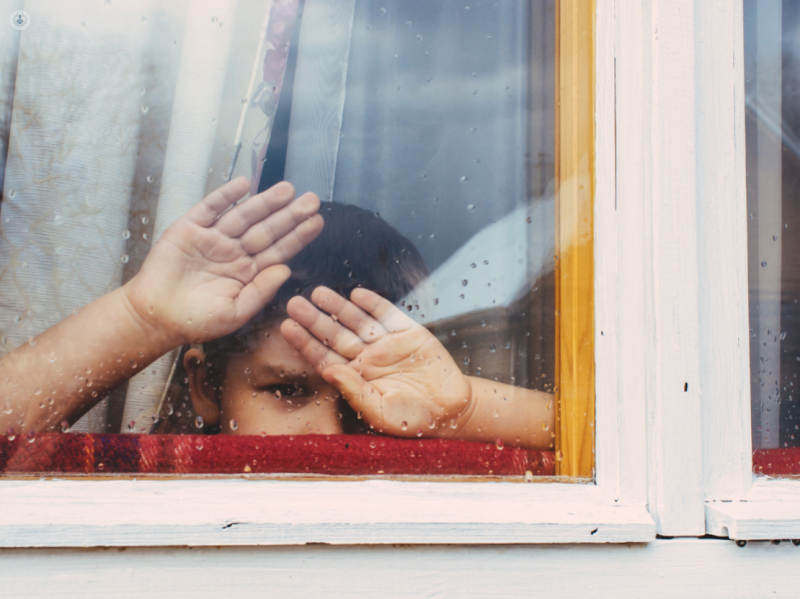COVID-19 headlines & tough lockdowns - how they’re taking a toll on our mental health
Written by:Television and news outlets have been very much focused on our physical safety from the novel coronavirus. Little attention, however, has been given to the psychiatric effects of the messages they transmit and the side-effects of these lockdown measures.
One of our top consultant psychiatrists, Professor Ben Green from Liverpool, explains what the likely effects ‘lockdown’ and negative news will have on the general public’s mental health and what we can do to protect ourselves.

How is the COVID-19 outbreak affecting public mental health?
Every day, we’re shown hourly bulletins containing alarming headlines on death rates and the dangers of breaking social distancing rules. Sometimes, these messages are even stridently and aggressively communicated on chat shows by TV anchors who ignore the effects of their opinions on vulnerable people.
The public mental health costs in people who have not been infected by the virus have yet to be counted on the quality of people's mental wellbeing, and increased rates of anxiety, agoraphobia, loneliness, alcohol misuse, depression, and suicide. Difficulties in accessing physical mental health care due to restrictions and service shutdowns have compounded the issue and doctors will be aware of patients who have been on waiting lists for assessments and treatment who have had their long-expected appointments cancelled.
There is likely to be a major impact on community mental health in the UK, as yet undetected and untreated. Around 7% of residents, particularly women in Wuhan had post-traumatic symptoms a month after the outbreak began (Liu et al, 2020). A study in Shenzhen, China also found that the overall prevalence of generalised anxiety disorder was 34% and depressive and sleep disorders both were at 18%. Additionally, younger people were more likely to develop depression than older people (Huang and Zhao, 2002).
What might be the effects of ‘lockdown’ on the general public?
In the face of unremitting headlines emphasising social distancing guidelines and international death figures, there will be a rise in the incidence of new anxiety disorders and relapses of existing patients with anxiety or obsessive-compulsive disorder.
- Anxiety & OCD
Fear of contamination is a key feature in some patients with OCD and media-added levels of fear increase the severity of symptoms. In obsessional people, the fear of missing key news has led to obsessive and prolonged checking of news sources and amplified distress, leading to additional unwanted behaviours such as hoarding food and face masks (Garfin et al, 2020).
- Loneliness and depression
Lockdown increases feelings of loneliness and we know that loneliness is a key risk factor for depression. Older people will be particularly affected by isolation from family and friends, loneliness, and bereavement, all of which may not be amenable to on-line solutions because of the so-called 'digital divide’.
- Stress and adjustment problems
Adults may be affected by the loss of occupation, poverty, and isolation and rely on aberrant coping strategies such as alcohol and gambling to manage stress. Lack of routine and isolation may affect access to medicines and lead to non-compliance and consequent breakdown of mood and psychotic disorders.
- Psychological effects on children & adolescents
Given that school is often the first place that children and adolescents seek help, the closure of schools will mean that many cannot access help. Issues they may face include substance misuse, gambling, domestic violence, sexual abuse, overcrowding, parental unemployment, and loss of their network of friends.
- Suicide
Previous epidemics have been linked to spikes in suicide rates and preliminary studies indicate this will also be a problem with COVID (Ammerman et al, 2020 and Chan et al, 2006). The SARS epidemic in 2003 led to a 30% increase in suicide in older people (Yip et al, 2010).
What can be done?
What can be done? There needs to be a radical re-think of how news is presented to avoid major mental health impacts in the general population and particularly to avoid precipitating relapses of illness in vulnerable patients. Messages about what people should do to protect themselves should be clear and aim to increase people's confidence, rather than foster uncertainty about the future (Peters, 2013).
In the meantime, we can all aim to protect ourselves and help the people around us by following this advice:
- Anxious people should be advised to strictly limit and reduce time spent watching broadcast media or reading social posts regarding COVID, divert themselves to films, programmes or other activities with positive messages.
- Promote befriending services and physical activity outdoors. Agencies that seek to limit external activity should be made more aware and be sensitive to the mental health needs of vulnerable people.
- Promote positive coping and resilience through appropriate community-based activities such as life-skills classes and arts-based interventions (Fancourt and Finn, 2019).
- Promote positive interpretations of events and reduce repetitive negative thinking (RNT) (Hirsch et al, 2018)
- Look into downloading apps that focus on sleep quality, routine and hygiene to help in promoting behaviour that can protect against anxiety and depression.
In order to protect those who already have existing mental health problems, or for anyone who believes they, a friend or family member may have developed one, online psychiatric appointments are required in the absence of face-to-face physical interviews. These appointments can offer rapid assessments and interventions to help with poor sleep, lowered mood and post-traumatic symptoms using computerised CBT, online CBT and antidepressants.
Other treatable conditions include persecutory or anxiety symptoms using interpretation training, online CBT, or short-term anxiolytics. Additionally, for those with an alcohol or drug dependence, evidence-based interventions are needed to limit the patient’s dependence on these substances.
Due to the predicted rise in suicide rates from past pandemics, screening for suicidal ideation in every assessment is also crucial during this time.
In his next article, Professor Green explains how a COVID-19 infection might impact a patient's central nervous system and mental health.
To have a consultation with Professor Ben Green via videoconference, visit his Top Doctors profile and check his availability.
References
Ammerman, B A. et al, (2020) Preliminary Investigation of the Association Between COVID-19 and Suicidal Thoughts and Behaviors in the U.S 10.31234/osf.io/68djp
Cai, L. et al (2015) Gestational Influenza Increases the Risk of Psychosis in Adults. Medicinal Chemistry, Volume 11, Number 7, 2015, pp. 676-682(7)
Chan, S M S et al, (2006). Elderly suicide and the 2003 SARS epidemic in Hong Kong. International Journal of Geriatric Psychiatry, 21, 113-118. doi: 10.1002/gps.1432
Fancourt D & Finn S What is the evidence on the role of the arts in improving health and well-being? A scoping review. WHO Regional Office for Europe, Copenhagen2019
Garfin DR et al. (2020) The novel coronavirus (COVID-2019) outbreak: amplification of public health consequences by media exposure. Health Psychol. 2020; (published online March 23.) DOI: 10.1037/hea0000875
Hirsch CR et al. (2018) Interpretation training to target repetitive negative thinking in generalized anxiety disorder and depression. J Consult Clin Psychol. 2018; 86: 1017-1030
Huang, Y & Zhao, N (2020) Generalized anxiety disorder, depressive symptoms and sleep quality during COVID-19 epidemic in China: a web-based cross-sectional survey. MedRxiv.org https://doi.org/10.1101/2020.02.19.20025395.
Li YC et al (2020) The neuroinvasive potential of SARS-CoV2 may be at least partially responsible for the respiratory failure of COVID-19 patients. J Med Virol. 2020; (published online Feb 27.) DOI:10.1002/jmv.25728
Mao L et al. (2020) Neurological manifestations of hospitalized patients with coronavirus disease 2019 in Wuhan, China. JAMA Neurol. 2020; (published online April 10.) DOI:10.1001/jamaneurol.2020.1127
McCall S et al. (2008) The relationship between encephalitis lethargica and influenza: a critical analysis. J Neurovirol. 2008; 14: 177-185
Peters GJY et al. (2013) Threatening communication: a critical re-analysis and a revised meta-analytic test of fear appeal theory. Health Psychol Rev. 2013; 7: S8-S31
White PD et al. (1998) Incidence, risk and prognosis of acute and chronic fatigue syndromes and psychiatric disorders after glandular fever. Br J Psychiatry. 1998; 173: 475-481
Wind TR et al. (2020) The COVID-19 pandemic: the ‘black swan’ for mental health care and a turning point for e-health. Internet Interv. 2020; 20100317
Yip PS et al. (2010) The impact of epidemic outbreak: the case of severe acute respiratory syndrome (SARS) and suicide among older adults in Hong Kong. Crisis. 2010; 31: 86-92


